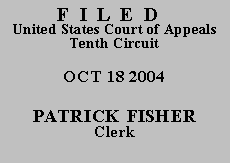

| JEROME SCAIFE, |
|
On June 1, 1989, Mr. Scaife was convicted by jury verdict of aggravated robbery and sentenced to a term of not less than ten nor more than forty years. Kan. Stat. Ann. § 21-3427. He was granted parole in 1998, but it was revoked a year later. On October 11, 2000, Mr. Scaife was denied parole. He filed a state post-conviction motion under section 60-1507 of the Kansas Statutes Annotated, in state district court on November 2, 2000, which was denied. On September 5, 2001, he was again denied parole. Meanwhile, on March 8, 2002, the Kansas Court of Appeals affirmed the state district court's denial of his state post-conviction motion. On July 1, 2002, Mr. Scaife filed the present federal habeas petition challenging his denial of parole in years 2000 and 2001. Mr. Scaife contended that the parole board's denial of parole violated his right to due process and equal protection, was arbitrary and capricious, and denied a liberty interest. Parole was granted in September 2002, but it was revoked in January 2004.
The district court determined that Mr. Scaife's release on parole mooted his claims, as Mr. Scaife challenged only his denial of parole, rather than his conviction. That is certainly true as to most of Mr. Scaife's arguments. See Vandenburg v. Rogers, 801 F.2d 377, 378 (10th Cir. 1986) (per curiam); United States ex rel. Graham v. U.S. Parole Comm'n, 732 F.2d 849, 850 (11th Cir. 1984) (per curiam). Mr. Scaife argues, however, that his sentence should have been converted under section 22-3717(f) of the Kansas Statutes, which provided a nine-month window during which certain inmates were eligible to have their sentences converted to one computed under the Kansas Sentencing Guidelines. Kan. Stat. Ann. § 22-3717(f) (1993 Supp.). He contends that a converted sentence already would have been served. Aplt. Br. at 2.
Mr. Scaife was not eligible for sentence conversion given the nature of his offense and his failure to meet the other requirements of the statute. His federal constitutional arguments were rejected by the state district court, and the state district court's disposition was affirmed by the state court of appeals. R. Doc. 1 attach, Exs. C-1, D-1 (Scaife v. McCune, No. 00011HC0074, slip op. at 5-8 (Leavenworth County D. Ct. Jan. 5, 2001), aff'd No. 87,912 (Kan. Ct. App. Mar. 8, 2002)). Challenges similar to that made by Mr. Scaife in this case have not been successful. See Pichon v. Bruce, No. 00-3387, 2001 WL 1544456, at *2 (10th Cir. Dec. 5, 2001); Mueller v. Bruce, No. 97-3184, 1998 WL 45496, at *1 (10th Cir. Feb. 5, 1998). Mr. Scaife is unable to show that the state court's resolution of his sentence conversion claim was an unreasonable application of Supreme Court precedent or was an unreasonable determination of the facts in light of the evidence presented to the state court. See 28 U.S.C. § 2254(d); Tennard v. Dretke, __ U.S. __, 124 S.Ct. 2562, 2569 (2004); Williams v. Taylor, 529 U.S. 362, 412-13 (2000).
For this court to grant a COA, Mr. Scaife must make "a substantial showing of the denial of a constitutional right." 28 U.S.C. § 2253(c)(2); see Miller-El v. Cockrell, 537 U.S. 322, 327 (2003). That means that he must show "that reasonable jurists could debate whether (or, for that matter, agree that) his petition should have been resolved in a different manner or that the issues presented were adequate to deserve encouragement to proceed further." Miller-El, 537 U.S. at 336 (internal quotations and citations omitted). We conclude that Mr. Scaife has not made such a showing. Accordingly, we DENY Mr. Scaife's renewed request for a COA and DISMISS this appeal.
Entered for the Court
Paul J. Kelly, Jr.
Circuit Judge